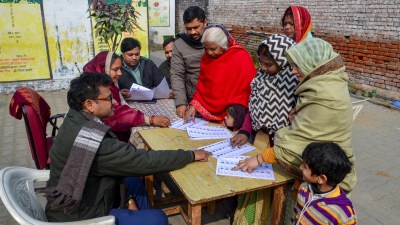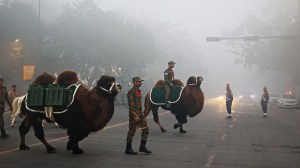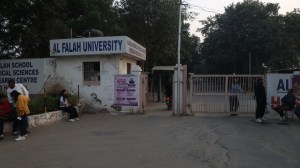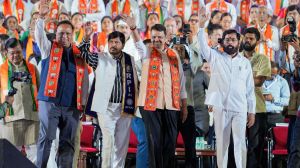Foreign underhand
TWENTY-THREE years ago, when the popular movement spearheaded by the All Assam Students8217; Union AASU demanding detection and deportati...

TWENTY-THREE years ago, when the popular movement spearheaded by the All Assam Students8217; Union AASU demanding detection and deportation of illegal Bangladeshi migrants was at its peak and the government had to resort to force to hold assembly elections in Assam, it resulted in a series of clashes that led to the Nellie massacre. More than 1,800 people suspected to be illegal migrants were mowed down by angry tribals, who had earlier asked them not to votes.
Even prior to that, when electoral rolls were being revised for a parliamentary by-election in Mangaldoi in 1978, a large number of suspected Bangladeshi migrants were found to have already enrolled themselves as Indian voters, courtesy one political party.
Migration of Muslims from erstwhile East Bengal and East Pakistan has bothered Assam since before independence. But several attempts to throw them out were subverted or stopped with opposition not just from the migrants, but also the Congress.
Though the Congress won the 1983 assembly elections, what it could not win was the confidence of the Assamese people. Thus one of the first things Chief Minister Hiteswar Saikia did was annouce the construction of a 72-km long wall8212;later modified to a barbed-wire fence8212;along the Indo-Bangladesh border.
Saikia also suggested to Prime Minister Indira Gandhi that the illegal migrants issue be settled by establishing tribunals that would identify and expel all those who crossed over after March 1971. Reputed lawyer Abdul Muhib Mazumdar drafted the Bill and on October 15, 1983, the Centre promulgated an ordinance directing setting up of tribunals 8216;8216;for determination8230; as to whether a person is or is not an illegal migrant, to enable the Central government to expel him/her from India8217;8217;.
The Illegal Migrants Determination by Tribunals Act, passed by Parliament on December 12, 1983, made India the only civilised country to have two laws for foreigners and migrants: one the Foreigners Act, 1946 applicable to the rest of the country and the other IMDT Act applicable only to Assam.
Moreover, while under all other laws, the onus of proof lies with the accused, the IMDT Act placed the burden on the complainant. 8216;8216;It8230; ensured that all illegal migrants in other states move to Assam because it is the only state from where they cannot be deported8230; for this law is designed to protect the illegal migrants by pretending that they are minority citizens,8217;8217; wrote D N Bezboruah, a former president of the Editors8217; Guild of India, in his famous three-part series titled 8216;Our Land, Their Living Space8217; over a decade ago.
Several eminent people, including Lt-Gen Retd S K Sinha, former Assam governor, have said that the IMDT Act, instead of detecting and deporting migrants, was more suitable for protecting and legitimising them. The Law Commission, in its September 2000 report, too recommended its repeal.
No doubt the Centre8217;s affidavit in the Supreme Court when the NDA was in power said that while half a million illegal migrants could be identified and deported from West Bengal where the IMDT Act was not applicable, only 1,500 could be deported from Assam till 2001. In 22 years, this figure touched just 1,538! And all this for an expenditure of nearly Rs 400 crores.
Parkash Singh, former DGP of Assam and UP and also former DG of BSF was even more specific. 8216;8216;This was a mischievous piece of legislation which took away the powers of issuing 8216;Quit India8217; notices, arrest, interrogation, etc from the police and passed on the burden of proof also, unlike in the Foreigners Act, to the police. The joke is that even the deported subsequently managed to come back!8217;8217; he said in 2003.
The striking down of the Act has is now bound to have a long-lasting impact on Assam politics. The Congress, which has always backed the Act, might lose the support of even the genuine Indian minorities, not to speak of the lakhs of Bangladeshi migrants who enrolled themselves as voters in the state. Several minority organisations have already held the Congress responsible for the repeal of the Act.
The AASU-AGP camp, on the other hand, is likely to gain, because repealing the Act is their old demand. The BJP, too, is claiming credit, despite the fact that it made a feeble attempt to repeal the Act by tabling a Bill only towards the fag-end of its term.
While it was former Assam advocate-general P G Baruah who first challenged the validity of the Act in Guwahati High Court in September 1992, it was the All India Lawyers Forum for Civil Liberties which took the matter to the Supreme Court in 1998. But one person who is getting a hero8217;s welcome in Assam today is Sarbananda Sonowal, an AGP MP, whose powerful petition filed in April 20008212;when he was AASU president8212;actually turned the tide against the Act.
- 01
- 02
- 03
- 04
- 05































